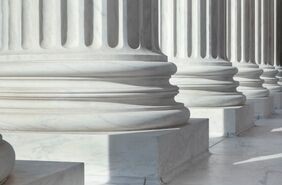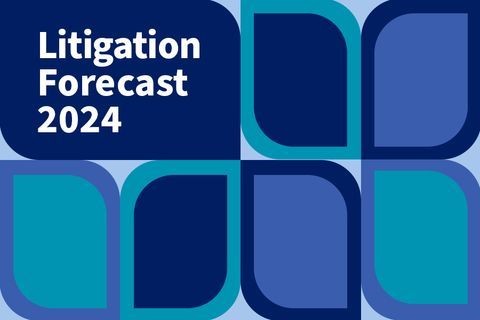Trade Secrets
Overview
Heightened competition, international threats, and the implementation of a widespread remote workforce have made the need to protect trade secrets more important than ever. Trade secrets are invaluable company assets that provide an essential competitive advantage.
Contacts
Insights
Client Alert | 3 min read | 04.02.24
On March 25, 2024, the Federal Circuit issued a precedential opinion in Edwards Lifesciences Corporation v. Meril Life Sciences Pvt. Ltd., a case with significant implications for the application of the safe harbor provision of 35 U.S.C. § 271(e)(1). This case involved the importation of two transcatheter heart valve systems by Meril Life Sciences Pvt. Ltd., an India-based medical device company, to San Francisco for a medical conference. According to Meril, these heart valve systems, part of Meril’s Myval System designed to treat heart disease, were never displayed or offered for sale at the conference but were instead stored in a bag in a hotel closet and later in a storage room. The Court’s decision to affirm the district court’s grant of summary judgment of noninfringement in favor of Meril brings to light the nuances of applying the safe harbor provision in patent infringement cases.
Blog Post | 02.22.24
Motion to Dismiss Based on Trade Secret Disclosure in a Patent for the Birds
Firm News | 3 min read | 01.10.24
Representative Matters
- Won largest contested trade secret verdict in history. After a seven-week trial, obtained a $919.9 million verdict against Kolon Industries, a Korean industrial conglomerate, for theft of DuPont’s KEVLAR® trade secrets. The verdict is the largest contested trade secrets award in history, and also the largest jury verdict ever awarded in the Commonwealth of Virginia. The case also involved multiple criminal and foreign proceedings. E.I. du Pont de Nemours and Company v. Kolon Industries, Inc., et al., (E.D. Va.).
- Defending client from former business partner seeking $100M. Former business partner, Rogerson Aircraft Corp., brought suit against our client, Bell Helicopter for trade secret misappropriation and breach of contract. Plaintiff claims that Bell misappropriated trade secrets relating to the specifications and requirements for helicopter avionics displays. The case involves complex and highly technical trade secrets. The matter is pending in Texas state court. Plaintiff seeks more than $100 million in damages.
- Protected a development contract. Defended BAE Systems in a high-profile trade secrets misappropriation action filed by Raytheon in the Eastern District of Virginia relating to the development of a next-generation light armoured vehicle, successfully defeating claims for preliminary injunctive relief that could have threatened a $750 million development contract.
- Defending client in alleged trade secret misappropriation and patent infringement suit. Purported competitor, AllRounds, brought suit against our client, Carta, and unrelated investors of Carta, for trade secret misappropriation and patent infringement in the Northern District of California.
- Won permanent injunction in China. Obtained a permanent injunction in China against former employees and their new-found company where they had stolen trade secret schematics and technical documents from client.
- Leveled the competitive playing field. Defended Siemens in a trade secrets misappropriation action involving positive train control (PTC) technology that plaintiff’s counsel characterized as a “billion-dollar case.” After a two-week evidentiary hearing, we successfully defeated Westinghouse’s claims for preliminary injunctive relief that could have derailed an entire business unit for Siemens.
- Protecting a franchisor from a misappropriating former employee and his new employer. Secured a consent judgment of trade secret misappropriation on behalf of a franchisor that included a permanent injunction against a former managerial employee of a franchisee and the upstart competing business who employed him.
- Protecting companies in a wide range of industries from renegade former employees. From businesses based on emerging technologies, to well-known consumer brands, to long-time brick and mortar companies, we have represented a wide range of companies in district courts nationwide, as well as in arbitrations, to obtain consent judgments of misappropriation that include permanent injunctions and other relief to stop the competitive threat of former employees who have taken trade secrets with them.
Contacts
Insights
Client Alert | 3 min read | 04.02.24
On March 25, 2024, the Federal Circuit issued a precedential opinion in Edwards Lifesciences Corporation v. Meril Life Sciences Pvt. Ltd., a case with significant implications for the application of the safe harbor provision of 35 U.S.C. § 271(e)(1). This case involved the importation of two transcatheter heart valve systems by Meril Life Sciences Pvt. Ltd., an India-based medical device company, to San Francisco for a medical conference. According to Meril, these heart valve systems, part of Meril’s Myval System designed to treat heart disease, were never displayed or offered for sale at the conference but were instead stored in a bag in a hotel closet and later in a storage room. The Court’s decision to affirm the district court’s grant of summary judgment of noninfringement in favor of Meril brings to light the nuances of applying the safe harbor provision in patent infringement cases.
Blog Post | 02.22.24
Motion to Dismiss Based on Trade Secret Disclosure in a Patent for the Birds
Firm News | 3 min read | 01.10.24
Professionals
Insights
Client Alert | 3 min read | 04.02.24
On March 25, 2024, the Federal Circuit issued a precedential opinion in Edwards Lifesciences Corporation v. Meril Life Sciences Pvt. Ltd., a case with significant implications for the application of the safe harbor provision of 35 U.S.C. § 271(e)(1). This case involved the importation of two transcatheter heart valve systems by Meril Life Sciences Pvt. Ltd., an India-based medical device company, to San Francisco for a medical conference. According to Meril, these heart valve systems, part of Meril’s Myval System designed to treat heart disease, were never displayed or offered for sale at the conference but were instead stored in a bag in a hotel closet and later in a storage room. The Court’s decision to affirm the district court’s grant of summary judgment of noninfringement in favor of Meril brings to light the nuances of applying the safe harbor provision in patent infringement cases.
Blog Post | 02.22.24
Motion to Dismiss Based on Trade Secret Disclosure in a Patent for the Birds
Firm News | 3 min read | 01.10.24
Contacts
Insights
Client Alert | 3 min read | 04.02.24
On March 25, 2024, the Federal Circuit issued a precedential opinion in Edwards Lifesciences Corporation v. Meril Life Sciences Pvt. Ltd., a case with significant implications for the application of the safe harbor provision of 35 U.S.C. § 271(e)(1). This case involved the importation of two transcatheter heart valve systems by Meril Life Sciences Pvt. Ltd., an India-based medical device company, to San Francisco for a medical conference. According to Meril, these heart valve systems, part of Meril’s Myval System designed to treat heart disease, were never displayed or offered for sale at the conference but were instead stored in a bag in a hotel closet and later in a storage room. The Court’s decision to affirm the district court’s grant of summary judgment of noninfringement in favor of Meril brings to light the nuances of applying the safe harbor provision in patent infringement cases.
Blog Post | 02.22.24
Motion to Dismiss Based on Trade Secret Disclosure in a Patent for the Birds
Firm News | 3 min read | 01.10.24

















